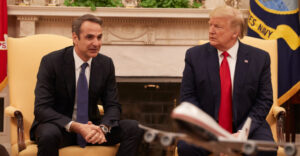The global upheaval caused by the aggressive policies of US President Donald Trump has not left Greece indifferent. This is because the trade war has created a crisis in the stock and bond markets, while at the same time currency exchange rates are highly volatile.
After the tariff freeze for 90 days things seem to be calming down a bit, but the concern remains. On the one hand because it is difficult to precisely measure the impact on economies, businesses and markets, and on the other hand because the combination of the trade war and the colossal geopolitical change caused by Trump’s policies necessarily alter all the balances, economic and political.
In a globalized economy, major changes such as those Trump wants to impose on international trade affect all countries without exception. Although Greek exports to the US are of small total value, the Greek economy is very exposed to international developments, on the one hand, because of its dependence on tourism and, on the other hand, because of the very large borrowing needs the country has to refinance its loans.
This means that the turbulence in the international bond market, which has already been observed in the past few days, if it continues and worsens, will negatively affect Greece’s borrowing costs. The effect will also be negative from the restriction of the movement of international investment capital, should the turmoil in the markets persist for a long time. Things will get even worse if the US and European economies are driven into recession.
The worst-case scenario is linked to a US credibility crisis, which, if it eventually deepens, will cause huge imbalances in all markets.
So far what seems to be the case is that the impact on the Greek economy from Trump’s policy will depend mainly on the progress of the European economy, bond market developments and currency exchange rates rather than on exports of Greek goods to the US.
The products
Our exports to the US are limited and have some peculiarities that work protectively. For example, Greek wine is sold only to restaurants and at extremely high prices, and exporters feel that it will make no difference in price for wealthy customers.
Greek oil and olives would have a problem if the EU tariff was 20%, while in Turkey and Morocco it is 10%, because then our oil would become more expensive than our competitors. However, by freezing the tariffs imposed on European exports at 10%, everyone is equally burdened and market shares will not be affected. Of course it may be because everything is getting more expensive that there is a slight drop for everyone.
The main problem for all countries’ exports to the US and of course ours is the reduction in the purchasing power of Americans that will come from the decline in the dollar, from inflation in the US and possibly from the downturn in the US economy if and when it comes true. The reduction in the purchasing power of Americans will also reduce their ability to consume imported European and Greek products.
However, the small value ($2 billion) of Greek exports to the US is not expected to create a major problem for the Greek economy.
Tourism
On the contrary, if the purchasing power of Americans declines, we may see a decline in the number of US tourists coming to Greece in a few months. If at the same time incomes in Europe decline due to a decrease in international trade and those in China (from Trump’s outrageously high tariffs on Chinese exports to the US), then the blow to Greek tourism could become alarming.
tourism, then, as our most powerful “export” product, is the critical factor for the Greek economy.
Tariffs may be the trigger, but the problem will come from the simultaneous decline in incomes and purchasing power in all countries. We probably won’t see the effect on tourism this year, since the 90-day freeze on tariffs brings us to August anyway, when vacations are booked and prepaid.
However, gradually, from the summer onwards, if things internationally do not calm down and if there are worrying developments on the geopolitical fronts, Greek tourism could take a hit. This will affect not only the balance with foreign countries, but also the incomes and liquidity in the domestic market and in a very large number of tourism-dependent industries and workers.
Investment
Another sector that could be hit by Trump’s policies is foreign investment in Greece. As things are not going well in international stock markets, large fund managers are closing positions in regional markets to get liquidity in their core markets. The Greek Stock Exchange is a regional market and relies heavily on foreign investors.
Liquidating their positions in Greek equities directly affects our stock market. However, this is not the only problem, but all investments in Greece that are linked to foreign capital. From real estate and hotels to investments in Greek companies. Greece needs foreign investment in order to grow and an international upheaval, and even more so an international recession, would cancel investment projects that already exist and have been initiated.
The bonds
Things would get even worse if the crisis in the bond market spreads. Already US bonds have shown a high sensitivity to Trump’s moves. Last Wednesday their prices fell and their yields rose. Although the following day, after the announcement of the tariff freeze, prices recovered to some extent, the concern remains.
US bonds are globally considered “safe havens”. Their performance depends on the state and prospects of the US economy, the international credibility of the US, the dollar and its interest rates. A fall in their prices leads to an increase in US borrowing costs, and the borrowing costs of all other countries are automatically adjusted upwards.
If bond borrowing costs rise, Greece has a serious problem due to very large borrowing needs. Predicting what will happen in this market is very complicated right now and the central banks, the US Fed and the European ECB, have difficult puzzles to solve to decide what to do with their interest rates.
The decisions
Trump is pushing the Fed to cut US interest rates quickly to avoid a recession. The Fed has a dual duty by statute: to control inflation and ensure full employment. Inflation is currently down in the US, but is projected to rise due to tariffs soon. The Fed is therefore finding it difficult to rush to cut interest rates. At the same time, US employment is at its peak, at full employment, unemployment is low and the Fed has no reason to cut rates to increase growth.
A falling dollar is also a deterrent to cutting rates, and even more of a deterrent would be a fall in international demand for US bonds. On the other hand, if there is a recession in the US, the Fed will have to cut interest rates. All these factors together, however, which have yet to evolve to show what needs to be done, create a very difficult puzzle. Whatever the Fed does, it fixes something and breaks something else. It probably won’t be in a hurry to make any decisions until the scene is clear.
The ECB is in an easier position and has decided to cut euro rates – and soon and forcefully. But it must take into account developments in the bond markets, especially now that its borrowing needs due to increased defence spending will be large. With inflation under control and the euro strengthening, the ECB can cut interest rates. But if a recession is triggered and European bonds lose their attractiveness, the interest rate should be attractive. Developments will show the way.
With inflation under control and the euro strengthening, the ECB may cut interest rates. But if a recession is triggered and European bonds lose their attractiveness, the interest rate should be attractive. Developments will show the way
In conclusion, then, the impact of Trump’s policy on the Greek economy is related to the broader impact on the European economy and bond markets.
The coming months will show whether Trump’s aggressive trade policy, even if he has limited it to China, and his regressions have finally caused a serious crisis of confidence and credibility for the US, so the problem will be generalized and very big for everyone. The good scenario is that the markets will assume that Trump has “gotten his act together” under pressure from the markets and senators who are passing on the reactions of the American people to him, and that the situation will be normalized, so the consequences of this imperial delusion of the American president will be limited.
Ask me anything
Explore related questions





